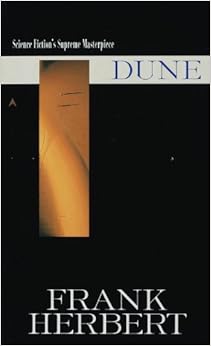 |
| Who knew a worm could be such a fearsome creature? Well done, Mr. Herbert. Well done. |
- human species encounters change
- focuses on ideas, sometimes at the expense of plot or character
- interdisciplinary, involving more than one branch of learning (history and math, for example)
- provides an approach to understanding
- carries experiments through that we wouldn't actually want to perform so the consequences are discovered and examined
- alternative point of view, representing someone or something we are not
All of that said, is Dune science fiction? Human species encounters change -- well, there is a breeding program, I suppose, and they also have to test people to see whether they are human or humanoid. Focuses on ideas -- This is one of the areas where I have a bit of a problem. The book spent much more time building its concept (desert planet) and less time building ideas applicable outside the book. After looking it up, it seems Herbert was addressing superheroes and their effect on society. Paul, the protagonist, begins the story as a young boy who is largely carefree. He ends the book by marrying for political reasons in a bid for the throne, worshiped by those around him and willing to kill for mixed reasons. So yes, there is a downward spiral. I had never considered science fiction as looking at the science of a person's personal growth. It is an intriguing concept.
 There is some science, and I liked how Herbert took an idea to an extreme -- lack of water extended to the point that people are literally harvesting dew and draining blood from dead bodies so the water is preserved. It turned from science fiction in that magic was introduced. People take a drug and can then carry the memories of all who came before them. Others are trained to have superhuman analytic abilities. If you use certain tones of voice, you can control other people. All that stuff is not explained scientifically and goes under the "magic" umbrella, for me.
There is some science, and I liked how Herbert took an idea to an extreme -- lack of water extended to the point that people are literally harvesting dew and draining blood from dead bodies so the water is preserved. It turned from science fiction in that magic was introduced. People take a drug and can then carry the memories of all who came before them. Others are trained to have superhuman analytic abilities. If you use certain tones of voice, you can control other people. All that stuff is not explained scientifically and goes under the "magic" umbrella, for me.
But this is all about the label the book has gained. I have a feeling Herbert was not really concerned about genre while he was writing this book. One thing he was obviously aware of and careful with was his use of foils. This book is full of marvelous parallels that are strong yet do not shout their presence.
A "foil" is an aspect of a story used for the sake of comparison. If everyone can fly around the world so fast the Earth stops spinning, then Superman becomes much less super. His abilities become normal. Every book that features characters with superhuman abilities needs to have characters without those abilities so the reader can have a standard to compare them to. Just because they are special compared to the real world does not immediately make them special in their own, and readers want the characters to be special in their own worlds.
 |
| I did not imagine this character as looking like Patrick Stewart, FYI. |
Paul has many foils, each for another aspect of his existence. Another noble boy his age is used to compare him to his peers. One of his father's trusted officials is used in place of his actual father, showing how he grows away from that standard. The leader of the people who populate the desert planet represents that people and how Paul changes them. It really would make quite the chart if one felt like writing out every foil in the book. Even the desert planet has foils in comparison with the planet they recently left and with the emperor's prison planet. Everything in this book has something to directly compare it with. This allows us to understand more, making each aspect more three-dimensional. It is brilliantly done.
It took me awhile to get used to reading this book, so I was a number of chapters in before I started thinking that I was reading an awesome book. In a way, Herbert has broken literary rules. "Free-indirect discourse" is what it is called when a story is told in the third person but one character's thoughts and experience are focused on. For instance, Jane Austen's Pride and Prejudice tells most of the story through Elizabeth. Authors tend to choose one point of view for the entire book or else they switch between characters at breaks in the story. Herbert switched points of view every few paragraphs. Sometimes it was nearly every other paragraph, in fact. It took quite some time to get used to, and it was a bit jarring. It also had interesting side effects in that we saw the story through the eyes of the villains and knew just who the traitor was many pages before the others did, because the traitor was thinking about it often. We even got to see a conversation between someone thinking, "This person could never be the traitor" and the traitor thinking, "I wish I wasn't a traitor, but it's the only way." We swapped between the two views multiple times throughout the conversation.
Dune was a good book. Really. It was just a bit different in the style it's written in and the way it is approaching science fiction. The story itself is well done and worth a read.

No comments:
Post a Comment